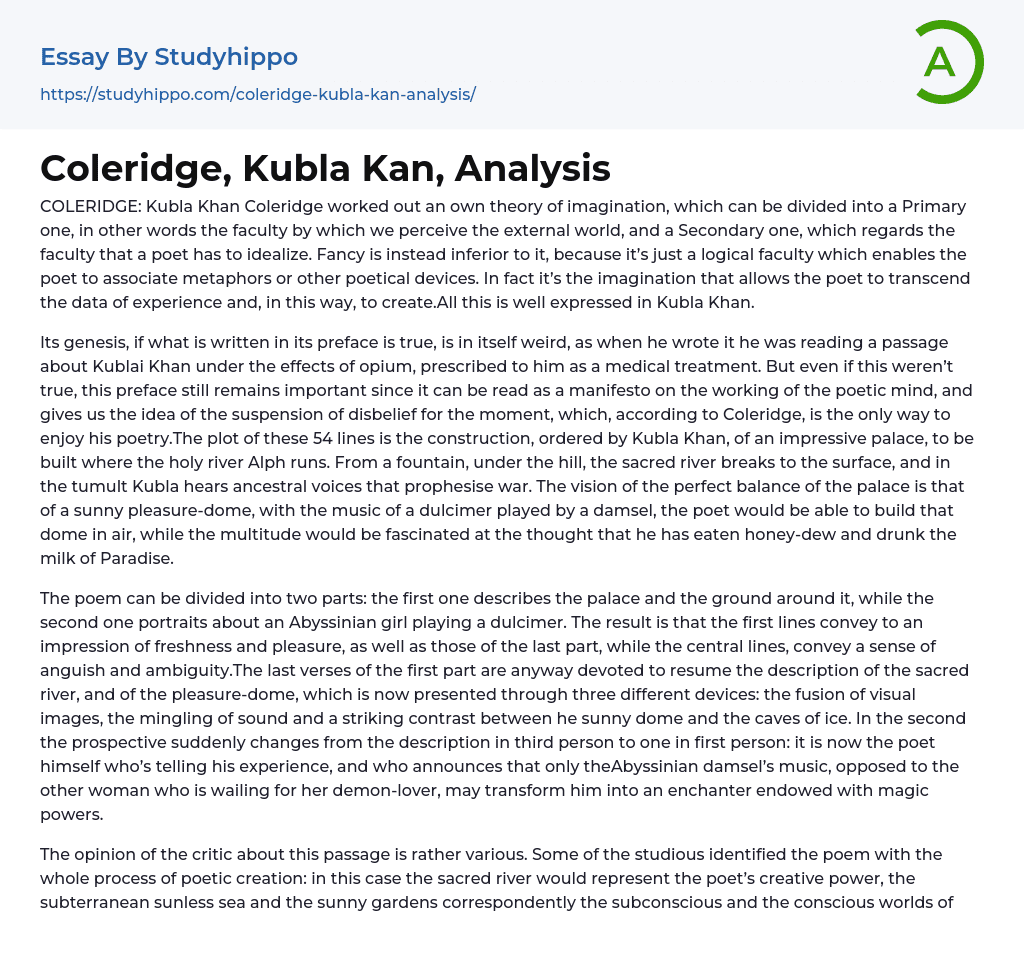

“Kubla Khan, or Vision in a Dream” – A Poem by Samuel Taylor Coleridge Essay Example
Kubla Khan Coleridge worked out an own theory of imagination, which can be divided into a Primary one, in other words the faculty by which we perceive the external world, and a Secondary one, which regards the faculty that a poet has to idealize. Fancy is instead inferior to it, because it’s just a logical faculty which enables the poet to associate metaphors or other poetical devices. In fact it’s the imagination that allows the poet to transcend the data of experience and, in this way, to create.All this is well expressed in Kubla Khan.
Its genesis, if what is written in its preface is true, is in itself weird, as when he wrote it he was reading a passage about Kublai Khan under the effects of opium, prescribed to him as a medical treatment. But e
...ven if this weren’t true, this preface still remains important since it can be read as a manifesto on the working of the poetic mind, and gives us the idea of the suspension of disbelief for the moment, which, according to Coleridge, is the only way to enjoy his poetry.
The plot of these 54 lines is the construction, ordered by Kubla Khan, of an impressive palace, to be built where the holy river Alph runs. From a fountain, under the hill, the sacred river breaks to the surface, and in the tumult Kubla hears ancestral voices that prophesise war. The vision of the perfect balance of the palace is that of a sunny pleasure-dome, with the music of a dulcimer played by a damsel, the poet would be able to build that dome in air, while the multitude would be
fascinated at the thought that he has eaten honey-dew and drunk the milk of Paradise.
The poem can be divided into two parts: the first one describes the palace and the ground around it, while the second one portraits about an Abyssinian girl playing a dulcimer. The result is that the first lines convey to an impression of freshness and pleasure, as well as those of the last part, while the central lines, convey a sense of anguish and ambiguity.
The last verses of the first part are anyway devoted to resume the description of the sacred river, and of the pleasure-dome, which is now presented through three different devices: the fusion of visual images, the mingling of sound and a striking contrast between he sunny dome and the caves of ice. In the second the prospective suddenly changes from the description in third person to one in first person: it is now the poet himself who’s telling his experience, and who announces that only theAbyssinian damsel’s music, opposed to the other woman who is wailing for her demon-lover, may transform him into an enchanter endowed with magic powers.
The opinion of the critic about this passage is rather various. Some of the studious identified the poem with the whole process of poetic creation: in this case the sacred river would represent the poet’s creative power, the subterranean sunless sea and the sunny gardens correspondently the subconscious and the conscious worlds of the poet. Moreover in some critics’ opinion the honey-dew and the milk of paradise stand for drugs.
The critic has also found another significance: in this way the first part would symbolize the fallen man who tries
to rebuild the lost paradise; in the second part it is prepared the destruction of the garden of heaven, but the fountain of immortality is intact. The vision of the third part, therefore, would be that of the perfect balance that rules the lost paradise, with paradise and death, in which nature, represented by music, let the poet harmonize with God: indeed, it’s not possible to reach heavens with ambition. However the poem is also a classic case of European fantasizing about the exotic and luxurious East.
- Boo Radley essays
- Genesis essays
- Richard iii essays
- Alice in Wonderland essays
- On the road essays
- Ozymandias essays
- The Nightingale essays
- Holden Caulfield essays
- Animal Farm essays
- 1984 essays
- A Hanging essays
- Shooting An Elephant essays
- A Tale Of Two Cities essays
- Adventures Of Huckleberry Finn essays
- Arthur Conan Doyle essays
- Brave New World essays
- Characters In Hamlet essays
- Characters In Romeo And Juliet essays
- Desdemona essays
- Diary Of A Wimpy Kid essays
- First-Person Narrative essays
- Frankenstein essays
- Heart Of Darkness essays
- Jane Eyre essays
- Jay Gatsby essays
- King Duncan essays
- Librarian essays
- Little Red Riding Hood essays
- Lord Of The Flies essays
- Silas Marner essays
- The Cask Of Amontillado essays
- The Catcher In The Rye essays
- The Crucible essays
- The Handmaid's Tale essays
- The Reader essays
- Virgil essays
- Wuthering Heights essays
- Candide essays
- Castle essays
- J. D. Salinger essays
- Ulysses essays
- Ethan Frome essays
- In Cold Blood essays
- Outliers essays
- Tuesdays With Morrie essays
- The Art of War essays
- Wife of Bath essays
- Huckleberry Finn essays
- The Lady With The Dog essays
- Great Expectations essays



